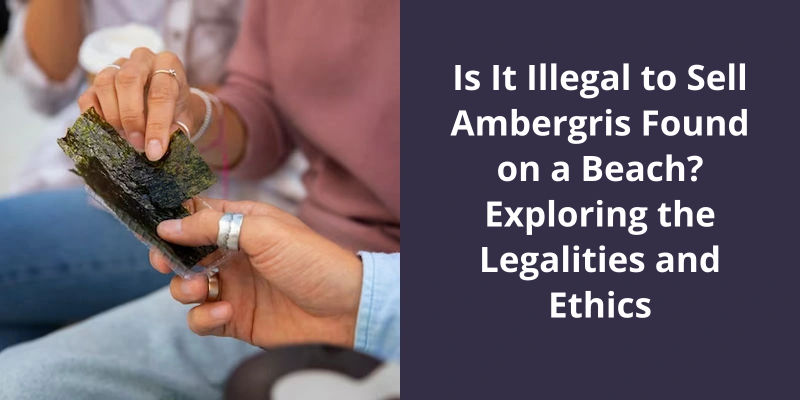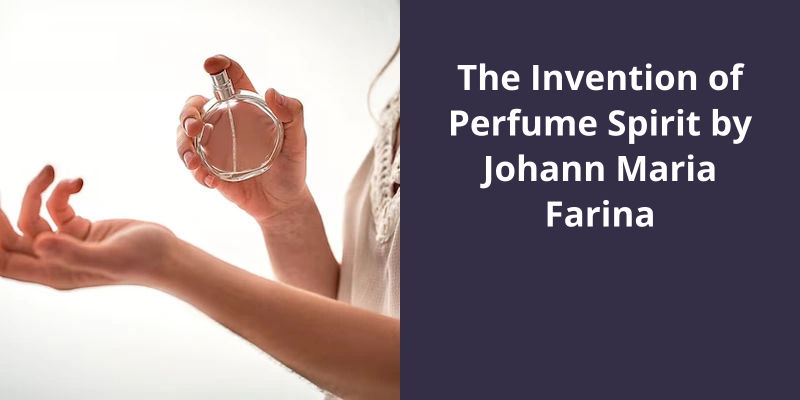The legality of selling Ambergris found on the beach varies from country to country. In the United States and Australia, it’s illegal due to the endangered status of the sperm whale, which produces the substance. However, in the UK and other countries, the sale of ambergris is legal as long as it was found washed up on a beach and not directly taken from a whale. Although, proof of its origin may be required to sell it legally. This is largely due to differences in laws regarding the protection of endangered species and marine wildlife. Therefore, always check the local laws before selling ambergris.

Is Ambergris Sale Illegal?
Ambergris is a waxy substance that’s produced in the digestive system of sperm whales and is expelled into the sea. It’s been highly valuable for centuries, and is used as an ingredient in perfumes, cosmetics, and certain types of cooking. However, the sale of ambergris is illegal in many countries due to the risk of whale hunting and habitat destruction.
In India, for instance, the import and export of ambergris is prohibited under the Wildlife Protection Act of 197The law bans the hunting of whales and the sale of their byproducts, including ambergris. Any person caught with the substance may face up to seven years in prison and a fine.
The most significant factor is the threat that it poses to whale populations. Because ambergris is rare and valuable, some people may be tempted to hunt or disturb living whales in search of it. This isn’t only cruel, but it can also disrupt the balance of the ocean ecosystem and cause long-term harm to the species.
Moreover, the illegal trade of ambergris can lead to organized crime and exploitation. It often involves smuggling, tax evasion, and other illegal activities that put people and natural resources at risk. The use of ambergris also promotes the unsustainable consumption of resources and the exploitation of vulnerable communities.
While it may be tempting to profit from this rare substance, it’s important to consider the long-term consequences of such activities. Instead of seeking profit from the destruction of the natural world, we should focus on sustainable practices that benefit both our planet and our communities.
While ambergris can be found in various parts of the world, it’s most commonly found in the Atlantic Ocean and along several other coastal regions. The collection of ambergris from the sea has been the focus of several industries, with most commercially collected ambergris originating from The Bahamas. However, the demand for this rare substance has led to several controversies and regulatory measures regarding it’s trade and use.
Where Is Ambergris Most Commonly Found?
The formation of Ambergris is believed to be a protective mechanism of the sperm whales digestive system. The hard beaks of giant squid, which make up a significant portion of the whales diet, aren’t easily digestible. The whales reaction to this is thought to be the formation of a protective waxy substance around the indigestible material, which is eventually excreted as the ambergris. Though it’s still a mystery how exactly this substance is formed, and how long it takes for it to develop, it’s generally agreed that it takes years to fully mature.
Ambergris has been prized throughout history for it’s unique aroma and it’s use in perfumes and other fragrances. It’s known for it’s musky, earthy scent and it’s been used in perfumes for centuries. The ancient Egyptians are believed to have used ambergris in their embalming process, and it was in high demand throughout the Middle Ages.
Although the trade of ambergris is legal in most countries, it’s illegal to hunt sperm whales for commercial purposes in many parts of the world, leading to a scarcity of the substance. In addition, ambergris is becoming increasingly difficult to find due to changes in the sperm whales diet, which are causing the whales to produce less of the substance. Today, ambergris is primarily found washed up on beaches after being expelled by whales. This has led to a thriving market for ambergris collectors, who scour the beaches in search of the valuable substance.
Despite it’s high value, many perfume manufacturers are moving away from using ambergris due to ethical concerns over the hunting of sperm whales. As a result, synthetic substitutes are becoming increasingly popular in the fragrance industry. These alternatives are designed to replicate the scent and texture of ambergris, while avoiding the need for hunting whales.
The Scientific Research Behind the Formation of Ambergris and It’s Properties.
- Ambergris is a waxy substance formed in the digestive systems of sperm whales.
- It’s believed to protect the whales’ intestinal tracts from the sharp beaks of squid, which is their primary food source.
- Over time, the ambergris is expelled from the whale through it’s feces and floats in the ocean.
- Ambergris has a unique and complex odor that’s been described as musky, sweet, and earthy.
- It’s been highly valued in the perfume industry for centuries because of it’s ability to enhance and stabilize fragrances.
- The chemical composition of ambergris is still not fully understood, but it’s thought to contain a combination of fatty acids, peptides, and other organic compounds.
- Scientists continue to study ambergris to better understand it’s properties and potential uses in various industries.
Aside from the location, there are other factors that may affect your success in finding ambergris, such as weather conditions and tides. Thus, it’s essential to keep in mind that luck and patience also play a significant role in your search for this valuable substance.
Where Is the Best Place to Find Ambergris?
For those who’re unfamiliar, ambergris is a substance produced by sperm whales and is often used in the production of certain luxury fragrances. It may sound strange to search for something that originates from a mammal’s digestive system, but ambergris has been highly prized for centuries due to it’s unique and pleasant scent. And for those who’re lucky enough to find it, ambergris can fetch extremely high prices on the open market.
Despite it’s high value, there’s no surefire way to find ambergris. The substance is extremely rare, and it can take years of searching before stumbling upon a piece. However, there are a few things that can increase your chances. One method is to search after a storm has passed, as strong currents can often bring ambergris closer to shore. Another strategy is to keep an eye out for any unusual objects that wash up on the beach, such as oddly shaped rocks or debris from a whale.
If you’re serious about finding ambergris, it’s important to familiarize yourself with the different types of whales that produce it. Sperm whales are among the most prolific producers of ambergris, and therefore, beachcombers are more likely to find it in areas where these whales frequent.
Finally, it’s important to remember that ambergris is a protected substance in many countries, including New Zealand, where the government tightly regulates it’s collection and sale. If you do find a piece of ambergris, make sure to follow all laws and regulations surrounding it’s disposal or sale. And above all, be patient – while it may be tempting to scour every beach in the country in search of ambergris, the reality is that it can take years of dedicated searching to find a single piece.
Source: Beachcombing for Ambergris
The market for ambergris is diverse, stretching across various countries and regions. Buyers of this highly sought-after substance can be found in places like Papua New Guinea, Indonesia, Thailand, Hong Kong, Jordan, Kuwait, Lithuania, and the Maldives. These buyers are on the lookout for top-quality ambergris that they can acquire for use in various industries, including perfume and medicine. Here, we explore the world of ambergris buyers and the buying leads associated with them.
Who Are the Buyers of Ambergris?
Ambergris is a unique and valuable substance that’s been sought after for centuries. It’s a waxy substance that’s produced in the intestines of sperm whales. As a result, ambergris has become a highly desired material for use in perfumes and fragrances.
The buyers of ambergris come from all over the world. Papua New Guinea, Indonesia, Thailand, Hong Kong, Jordan, Kuwait, and Lithuania are just a few countries where buyers look for this rare and precious substance. These buyers often work for large perfume manufacturers or independent perfumers who’re always in search of new and unique ingredients to use in their creations.
In Papua New Guinea, local fishermen will often come across ambergris while out at sea. They’ll then sell it to buyers who travel to the area specifically for this purpose.
The market for ambergris is highly competitive, and buyers are willing to pay top dollar for the best quality ambergris. The price of ambergris can vary depending on many factors, including the quality of the material, the location, and the demand for it. In some cases, buyers may have to pay more than $20,000 per kilogram for high-quality ambergris.
They’re willing to pay top dollar for this unique substance, which has become an essential ingredient in the perfume-making industry.
The Process of Extracting Ambergris From Whale Intestines and the Ethical Concerns Around It.
Ambergris is a waxy substance produced in the intestines of sperm whales, and is highly valued in the fragrance industry for it’s musky scent. The traditional method of extracting ambergris involves collecting whale intestines from stranded or hunted whales, and cutting them open to remove the ambergris. This practice has raised ethical concerns due to the cruelty involved in killing whales and the potential impact on whale populations. As a result, many countries have banned the harvesting and trade of ambergris, and some fragrance companies are using synthetic alternatives instead.
Conclusion
In conclusion, the sale of ambergris found on a beach is illegal due to it’s association with endangered marine mammals. Though some may argue that it’s a valuable commodity, it’s important to prioritize the protection and preservation of our ocean wildlife. The unauthorized collection and trading of ambergris not only risks the well-being of these creatures, but also undermines efforts to conserve their populations. Therefore, it’s essential to respect and follow laws and regulations regarding the handling of marine resources, and instead seek out alternative means of obtaining natural resources that don’t harm the environment or contribute to the extinction of our marine wildlife.





